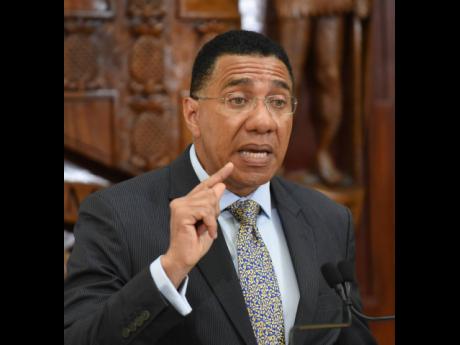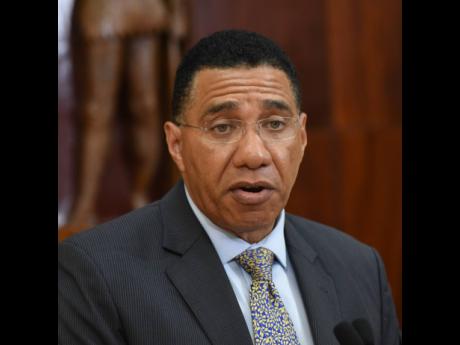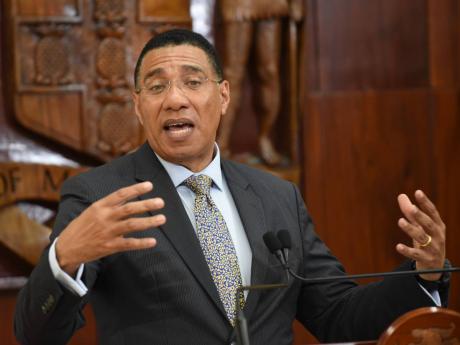Editorial | No to a defanged IC
As this newspaper has been warning for a long time, Jamaicans must be vigilant against any effort to weaken the Integrity Commission (IC), to make it even less effective as an anti-corruption watchdog.
While the most immediate threat appears to be from government legislators, given that people in office are the ones likely to be under greater scrutiny, citizens should not be surprised if a quiet coalition of strange bedfellows were to emerge in the Parliament to undermine the entity. Politicians generally share a common interest in opacity.
The Gleaner raises these concerns in the face of this week’s tabling in Parliament of a report by the IC’s director of investigation, Kevon Stephenson, into the financial affairs of Prime Minister Andrew Holness, in the face of the Commission’s failure, over two reporting periods (2020-2021 and 2021-2022), to certify Mr Holness’ annual income, asset and liabilities filings. In this context, and given the past agitation of Jamaica Labour Party (JLP) MPs against the IC, Mr Holness’ latest declaration of the need to amend the Integrity Commission Act must be watched closely for how it unfolds.
The Commission’s director of corruption prosecutions, Keisha Prince-Kameka, ruled that there was not sufficient evidence to claim Mr Holness deliberately failed to report a handful of bank accounts, with relatively small amounts of money, on which his name appeared. These accounts were, separately, in the names of his father and mother as well as a former employee in his constituency office.
But in a separate investigation into illicit enrichment – which was triggered by the first – Mr Stephenson said that in the absence of certain specific data, he could not definitively determine whether the prime minister had spent more money than could legitimately be accounted for from his known sources of income.
Nonetheless, Mr Stephenson recommended the finance ministry’s Financial Investigations Division (FID) investigate the flow of money into and out of, and between three private companies controlled by the prime minister, and whether there was intermingling of his private funds and those of an independent and registered good works foundation that he had established. He suggested that there was unaccounted-for net outflows from one of Mr Holness’ companies, which, presumably, was being financed by its parents.
OSTENSIBLE ERROR
With respect to the second issue, money from the account of the foundation was used to bump up a bond purchase in Mr Holness’ name, which the prime minister argues was an inadvertence, stemming from the broker’s failure to properly carry out his instructions. Mr Stephenson, however, rejected the prime minister’s explanation, noting that the original instructions were in writing, and that Mr Holness made that claim only after the matter was under investigation.
Mr Stephenson argued further that even if a mistake was made initially, Mr Holness would have received statements from the brokers showing returns on the bond, which should have alerted him to ostensible error.
Mr Stephenson also proposed that the tax authorities review one of the prime minister’s companies for income tax liabilities, saying that the business had reported nil earnings when it should have net income, that year, of over J$5 million. Additionally, he flagged for attention by the tax authorities, a young, private firm that ostensibly loaned one of Mr Holness’ companies over J$20 million in a year when its reported income was less than J$400,000.
In another matter, the IC’s investigator urged the securities markets regulator to look into how a large brokerage house loaned J$50 million to an entity solely owned by Mr Holness.
FAINT AND DAMNING PRAISE
The prime minister has rejected all the negative interpretations that may be implicit in Mr Stephenson’s findings and recommendations, noting the decision by the IC’s prosecutor with respect to the bank accounts. He argued that the only substantive finding the Commission’s investigator had was that there was a one per cent difference in his reported net worth and what IC calculated from going through five years of returns.
“Let it be known that I have complied with any obligation placed on me within the law,” he said. “The company with which I am directly associated is compliant and up to date with its tax filings.”
In the absence of further particulars, The Gleaner does not, at this point, dispute Mr Holness’ conclusions about the report. We look forward to the findings of the agencies called on to go further. We expect that they will do their jobs professionally.
We, however, note this statement by the prime minister: “While I will not pursue the view that this was politicised, I believe it is commonly agreed that the law governing the IC is in urgent need of revision.”
Given the Government’s past attitude to the IC, especially its ham-fisted approach to releasing an investigative report into the prime minister’s conduct in February 2023, Mr Holness’ suggestion that he was not holding the position that the current matter is being politicised, is, at best, we believe, faint and damning praise.
We also place that into the context of the ongoing review of the law by a parliamentary committee when government members, especially Everald Warmington, but not exclusively, has advocated gutting the legislation and placing the Commission directly under the thumbs of Parliament.
We note, too, the recent attempts by the Speaker of the House to manage the tabling of reports by the IC in a manner that would lessen transparency and public scrutiny. These things must not happen.



